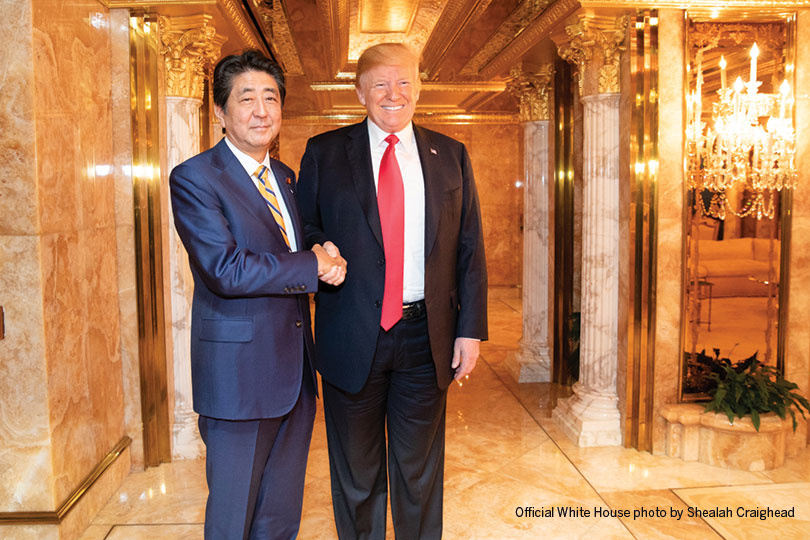By Jessica Domel
Multimedia Reporter
A top buyer of U.S. agricultural goods is now ready to discuss a trade deal between the two nations.
U.S. President Donald Trump and Japanese Prime Minister Shinzo Abe announced Wednesday, Sept. 26, they’ve agreed to start negotiations.
“This was something that, for various reasons over the years, Japan was unwilling to do, and now they are willing to do so,” Trump said. “We’re very happy about that, and I’m sure that we’ll come to a satisfactory conclusion.”
The pair were in New York for the United Nations General Assembly.
“I think it’ll be something very exciting. Japan is very smart. (They’re) great negotiators. Up until now, they’ve done very well, and they’ll continue to do very well,” Trump said. “We’re going to have a really great relationship, better than ever before on trade.”
Japanese officials have put off a bilateral trade deal with the U.S. since President Trump pulled the country from the Trans-Pacific Partnership (TPP) after taking office.
Japan is the largest customer of U.S.-raised pork and the second largest customer of U.S. wheat and corn. It is the third largest purchaser of U.S.-grown soybeans.
That ranking could change in the coming months as Japan is preparing to lower tariffs on select agricultural imports from TPP-member nations, which could create competition with U.S. goods.
A bilateral trade deal with the U.S. could level the playing field.
“I think it’s going to be better for Japan and better for the United States,” Trump said. “It can only be better for the United States, because it didn’t get any worse than what has happened over the years. So I think it’s going to be better, really, for both countries.”
Japanese buyers purchased $713 million of wheat, $2.1 billion in corn, $1.5 billion of pork and $974 million in soybeans from the U.S. in 2017.
The pursuit of this trade and other trade opportunities is good news for America’s farmers and ranchers, according to Zippy Duvall, president of the American Farm Bureau Federation.
“Despite substantial tariffs that limit our farmers’ and ranchers’ potential to access Japan’s food and agriculture markets, in 2017 Japan was the fourth-largest market for our agricultural goods,” Duvall said. “There is great potential for our farm exports in Japan if we remove Japanese trade barriers.”
With increased global competition, Duvall said there’s an urgent need to hammer out a trade agreement.
“In addition, this mutual agreement will address key trade issues that should create additional opportunities down the road and could lead to wider cooperation at the global level that includes the European Union,” Duvall said. “The United States is the world leader in agricultural exports and this is a key development for U.S. farm exports at a time when we desperately need this kind of good news.”
According to Politico, Japanese officials have indicated the maximum level of market access they’re willing to give the United States is equal to what they’ve granted other countries.
U.S. Trade Representative Robert Lighthizer is expected to talk to Congress regarding the use of Trade Promotion Authority, or the fast-track process, in negotiations.
Japan is currently among the nations currently paying an additional 10 percent tariff on aluminum and 25 percent tariff on steel sold into the U.S.
President Trump has also threatened new tariffs on automobiles from the country.
The U.S. and Japan will enter negotiations once necessary protocols are followed in each country, according to a joint statement.

